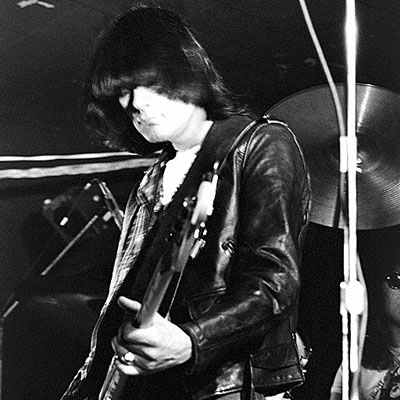I’m not the man qualified to talk about the degree to which the Ramones both defined punk music and destroyed all the conventions of the music industry that came before. Punk opened up a whole new audience of young, disaffected and alienated youth to their voice at almost the exact same time hip-hop music was doing the exact same thing. Pundits, critics and plebs alike have pondered those similarities, noted the moments when those genres collaborated or crossed over, and bemoaned the fact that both were commercialized and marketed to the masses in a way that defiled the rebellious spirit they represented.
The tragic nature of Dee Dee Ramone’s “Standing in the Spotlight” should therefore hopefully not be lost on anyone, even a punk music neophyte like me, as the man born Douglas Glenn Colvin rechristened himself “Dee Dee King” and suddenly declared himself “the king of hip-hop”. In one of the worst examples of rapping I can think of from a competent musician, King’s “Mashed Potato Time” attempted to copy the success of the Fat Boys x Beach Boys on “Wipeout” two years earlier, but while the latter was a whimsical homage to surf rock, the former is a horrid homage to doo wop that disgraces punk, rap and rock in one fell swoop.
“It’s time to rock/it’s time to rap” quips King with an ASTOUNDING degree of sincerity. The simplistic structure of his lyrics tarnishes the fact the man was considered nearly Godlike to fans of his band. He delivers cornball bars as though he honestly believes them: “I’m badder than Death, Dee Dee King is my name”. Sadly Mr. Colvin you were not — you passed away from a heroin overdose a little over 17 years ago (June 5, 2002). The sadness of his fans worldwide may have for a time caused them to forget the musical abortion he gave birth to in 1989, but this is one of those inexplicable albums that has been re-released in high quality 180 gram vinyl. I can’t imagine anyone needed a pressing of “Too Much to Drink” that badly but given how Dee Dee struggled with his addictions it’s at least honest.
This song is the one shining moment of “Standing in the Spotlight” and it’s only a 30 watt bulb at best. “A Heineken, would be fun” is a terrible rap only made worse by King’s stilted delivery, but the song’s mixture of drums and rock guitars evokes memories of Run-D.M.C.’s success throughout the 80’s. It’s pretty clear that their mixture of rock and rap inspired King to think he could duplicate their formula, but a few songs into “Standing in the Spotlight” he realizes he’s not cut out for it. From that point he bounces between bad decisions in one genre after another. Those who are kind to his legacy have noted the struggles with sobriety that informed “Too Much to Drink” are likely responsible for the bad choices he made musically with songs like “Baby Doll” but they are mistakes nonetheless.
“Poor Little Rich Girl” may be the one song fans of his punk rock roots may cling onto as a worthwhile entry in his legacy. The 20 minutes that follow are devoid of hope in any form. “German Kid” aspires to validate his credentials the same way Everlast validated Irish white boys and fails hard. “The Crusher” is charming to a pro wrestling fan as it sounds like King is channeling his fantasies of being just like Reginald Lisowski, but other than revealing to me he loves the squared circle as much as I do it’s no better than his other raps. The less I say about King declaring himself “the cut creator, the master of rap” on “I Want What I Want When I Want It” the better.
A recent Cinemassacre video posited the theory that there’s no such thing as a “good” movie or a “bad” movie. If it’s so good that you love it, it’s a success. If it’s so bad that you can laugh at it (like Tommy Wiseau’s “The Room”) it’s a success too. By those criteria the only time a movie can fail is when it’s so boring that it’s neither good NOR bad. By this very generous definition I can classify “Standing in the Spotlight” a success, because it’s definitely bad enough to be memorable and garner laughs. Much like the ill-conceived rap career of “Macho Man” Randy Savage, Dee Dee Ramone’s album is worth a chuckle just because he thought it was a good idea even beyond the point where he clearly shouldn’t have continued to record it. It’s undeniably campy schlock that stands as a testament to how even the most brilliant of artists can be undone by sheer hubris.

